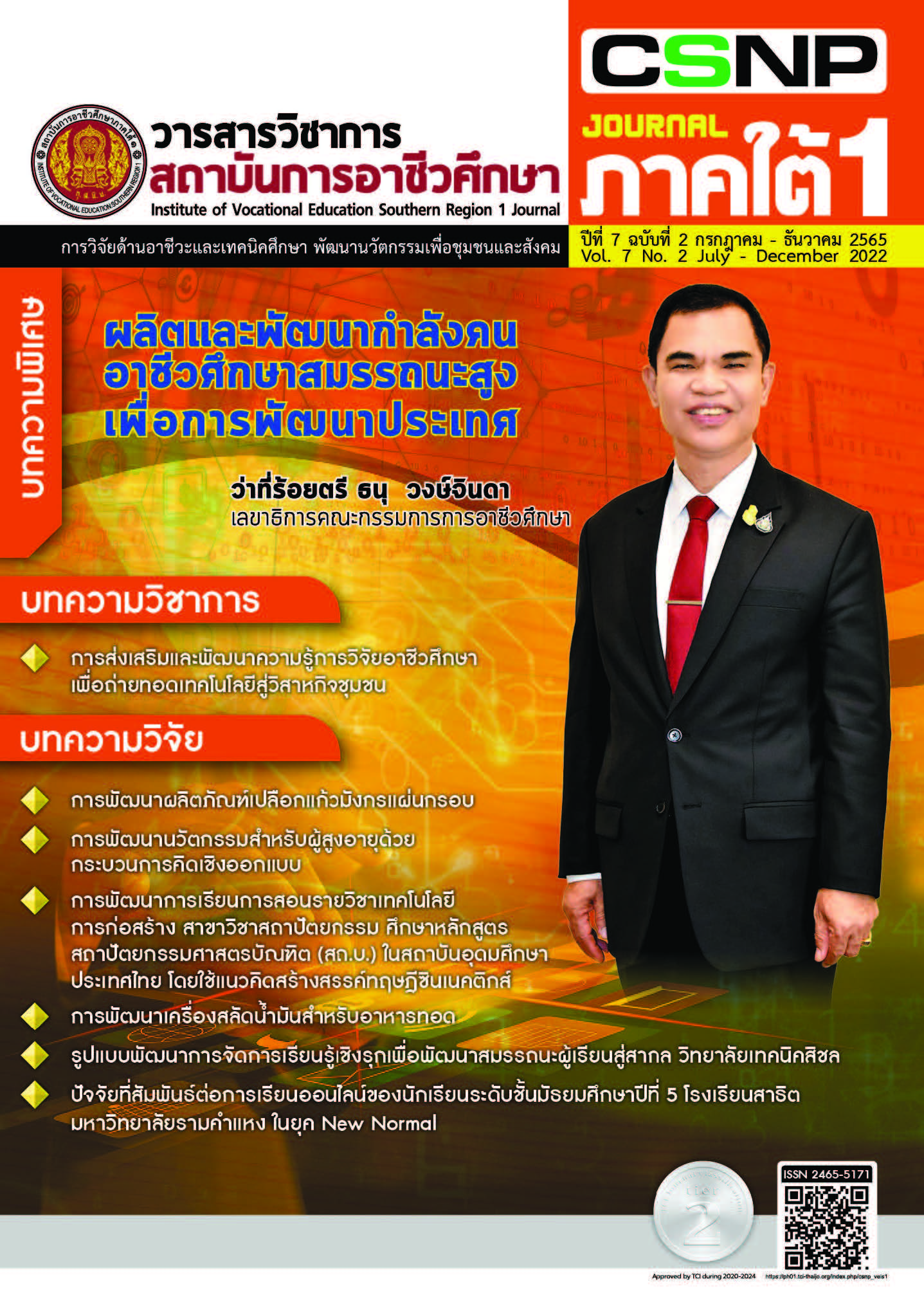Development of Innovation for the Elderly through a Design Thinking Process
Keywords:
Innovation Development, Anti-slip Rubber Floor, The Elderly, Design Thinking ProcessAbstract
The objectives of this research were to: 1) develop an innovative non-slip floor model made from para rubber latex to reduce slip-and-fall accidents of the elderly through a design thinking process; 2) find the effectiveness of the innovation prototype from the laboratory through an action research model based on the design thinking process.
The results showed that applying the five-step design thinking process to innovation development received cooperation from the community members in Lang Suan District, Chumphon Province. The brainstorm was conducted to solve the community problems, especially those related to the elderly. This led to the development of an innovation prototype that used a local natural material i.e., para rubber latex produced in Surat Thani and Chumphon Provinces. The rubber plantation is the main occupation of the local community in the south. The results of the efficiency test showed that the innovation prototype from the laboratory was developed from 100% natural rubber latex with the anti-slip properties and the mechanical properties as follows. The cure time at 150˚ C = 4.32, the hardness. = 70.4, the tensile strength (MPa) = 8.48, and elongation at break (%) = 333, etc. The results can be concluded that the innovation prototypes can be used as a guideline for sustainably solving the slip-and-fall accidents problems of the elderly in the community.
References
วิพรรณ ประจวบเหมาะ และคณะ. (2556). รายงานการศึกษาโครงการติดตามและประเมินผลการดำเนินงานตามแผนผู้สูงอายุแห่งชาติ ฉบับที่ 2 (พ.ศ.2545 - 2564) ระยะที่ 2 (พ.ศ.2550 - 2554). กรุงเทพมหานคร: วิทยาลัยประชากรศาสตร์ จุฬาลงกรณ์มหาวิทยาลัย.
วิราภรณ์ โพธิศิริ และคณะ. (2560). รายงานการศึกษา โครงการติดตามและประเมินผลแผนผู้สูงอายุแห่งชาติ ฉบับที่ 2 (พ.ศ.2545-2564) ระยะที่ 3 (พ.ศ.2555-2559). กรุงเทพมหานคร: วิทยาลัยประชากรศาสตร์ จุฬาลงกรณ์มหาวิทยาลัย.
Karl S. (2020). [online]. The Design Thinking Process – How does it work. [Retrieved December 21, 2021]. from https://www.maqe.com/insight/the-design-thinking-process-how-does-it-work/.
มะยุรีย์ พิทยาเสนีย์ และพิชญาภา ยวงสร้อย. (2564). การคิดเชิงออกแบบ: ครูนวัตกรวิถีใหม่. วารสารมหาวิทยาลัยราชภัฏลำปาง, 10(2), 80-92.
ปภาวิน ศรีพล. (2564). การประยุกต์ใช้กระบวนการการคิดเชิงออกแบบในการแก้ปัญหาชุมชนจากผักตบชวาโดยนำมาทำกระถางต้นไม้คอนกรีต. สารนิพนธ์วิศวกรรมศาสตรมหาบัณฑิต สาขาวิชาการจัดการงานวิศวกรรม มหาวิทยาลัยสยาม, กรุงเทพมหานคร.
ชัยวุฒิ วัดจัง และคณะ. (2563). บล็อกยางปูพื้นสำหรับผู้สูงอายุ: ผลของสารหน่วงปฏิกิริยาการคงรูปต่อสมบัติของบล็อกยางปูพื้น. Science and Technology RMUTT Journal, 10(1), 47-60.
Downloads
Published
Issue
Section
License
Copyright (c) 2022 Institute of Vocational Education Southern Region 1 Journal

This work is licensed under a Creative Commons Attribution-NonCommercial-NoDerivatives 4.0 International License.



